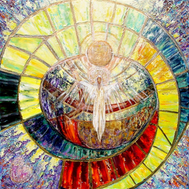PROGRESSIVE

The realities of contemporary life are radically different than those of First Century Palestine. The Progressive Episcopal Church accepts the challenge of discovering and experiencing the eternal and universal truths found within the ancient Christian tradition in the context of modern life.
The Christian faith is a living faith and is adaptable to every stage of human progress and development. While the external forms and creative expressions of Christianity may continue to expand with each generation, the teachings of Jesus continue to provide the foundation of spiritual evolution and human progress: "The Lord our God, the Lord is one. Love the Lord your God with all your heart and with all your soul and with all your mind and with all your strength. Love your neighbor as yourself. There is no commandment greater than these.” ~Mark 12:28-31
The Progressive Episcopal Church has articulated the vision of a contemporary expression of the ancient Christian faith in the Principles.
EPISCOPAL

The Progressive Episcopal Church is an association of episcopal communities and ministries. 'Episcopal' is the English derivation of the New Testament Greek επίσκοπος episcopos 'overseer, guardian'. This means we are a fellowship of Christians who acknowledge and embrace the Historic Episcopate, the traditional succession of bishops from the earliest Christian communities.
Episcopal polity is a form of church governance where the spiritual guidance and pastoral responsibility of local Christian communities rest in a bishop. Historically, fellowships of these local Christian communities are known as 'dioceses' or 'episcopates'. This episcopal structure is found in the ancient churches of both the Eastern and Western Christian traditions.
The Progressive Episcopal Church is an association of autonomous episcopal churches and ministries committed to sharing, support, encouragement, collaboration and unity in the work of making the Vision of a progressive expression of the ancient Christian faith a contemporary reality. Each member community and ministry, united with its bishop, is independent in its governance and organizational affairs.
Episcopal polity is a form of church governance where the spiritual guidance and pastoral responsibility of local Christian communities rest in a bishop. Historically, fellowships of these local Christian communities are known as 'dioceses' or 'episcopates'. This episcopal structure is found in the ancient churches of both the Eastern and Western Christian traditions.
The Progressive Episcopal Church is an association of autonomous episcopal churches and ministries committed to sharing, support, encouragement, collaboration and unity in the work of making the Vision of a progressive expression of the ancient Christian faith a contemporary reality. Each member community and ministry, united with its bishop, is independent in its governance and organizational affairs.
CHURCH

The Progressive Episcopal Church is a community of the one, holy, catholic and apostolic Church. Inspired by the experiences of the early Christian communities, the people of the Progressive Episcopal Church seek to live out the Gospel in everyday life guided by scripture, tradition and reason. The Progressive Episcopal Church encourages authentic Human experiences of the Divine through the teachings and example of Jesus Christ, while recognizing and respecting the diversity of spiritual experiences throughout the Human community.
The Progressive Episcopal Church is an association of autonomous Christian communities dedicated to exploring, discovering and experiencing the eternal and universal truths found among the great religions of the world in the context of the ancient Christian faith tradition.
These universal truths form that true catholic faith which is catholic because it is a statement of universal principles. "The identical thing that we now call the Christian religion existed among the ancients and has not been lacking from the beginnings of the human race until the coming of Christ in the flesh, from which moment on the true religion, which already existed, began to be called Christian" (St. Augustine of Hippo).
The See of Canterbury, England and its Archbishop are central historic figures and symbols of Anglican heritage. The Archbishop of Canterbury is the senior bishop and principal leader of the Church of England, the symbolic head of the worldwide Anglican Communion and the diocesan bishop of the Diocese of Canterbury.
On 9th November 2012, Justin Welby, Bishop of Durham, was named as the successor to Archbishop Rowan Williams who stepped down from the position of Archbishop of Canterbury on 31st December 2012. Bishop Justin officially became Archbishop of Canterbury at a legal ceremony at St. Paul's Cathedral on 4th February 2013, and his public ministry was inaugurated at Canterbury Cathedral on 21st March 2013. He is the 105th in a line which goes back more than 1400 years to Saint Augustine of Canterbury, the 'Apostle to the English'.
Although organizationally independent of the Church of England, the Progressive Episcopal Church, firmly embracing our historic Anglican heritage and traditions, respects the Archbishop of Canterbury as Primus inter pares (a Latin phrase meaning 'First among equals') because of the historical significance of the episcopal See of Canterbury since its founding in 597 CE.
In modern times, a series of voluntary meetings, particularly the Lambeth Conference (established in 1867), the Consultative Council (founded in 1971) and the Primate's Meeting (started in 1979), serve as instruments of communion for some Anglican bishops and their communities. Because these meetings possess no legal or ecclesiastical authority, and because Anglican identity is not based on the attendance of meetings, not all Anglican bishops or communities participate in them.
In the historic spirit of Anglican autonomy and in faithfulness to the all inclusive and liberating nature of the Gospel of Jesus Christ, the Progressive Episcopal Church, together with many other Anglican communities, does not officially participate in these meetings and does not necessarily embrace all resolutions, 'covenants' or statements they publish.
The Progressive Episcopal Church is an association of autonomous Christian communities dedicated to exploring, discovering and experiencing the eternal and universal truths found among the great religions of the world in the context of the ancient Christian faith tradition.
These universal truths form that true catholic faith which is catholic because it is a statement of universal principles. "The identical thing that we now call the Christian religion existed among the ancients and has not been lacking from the beginnings of the human race until the coming of Christ in the flesh, from which moment on the true religion, which already existed, began to be called Christian" (St. Augustine of Hippo).
The See of Canterbury, England and its Archbishop are central historic figures and symbols of Anglican heritage. The Archbishop of Canterbury is the senior bishop and principal leader of the Church of England, the symbolic head of the worldwide Anglican Communion and the diocesan bishop of the Diocese of Canterbury.
On 9th November 2012, Justin Welby, Bishop of Durham, was named as the successor to Archbishop Rowan Williams who stepped down from the position of Archbishop of Canterbury on 31st December 2012. Bishop Justin officially became Archbishop of Canterbury at a legal ceremony at St. Paul's Cathedral on 4th February 2013, and his public ministry was inaugurated at Canterbury Cathedral on 21st March 2013. He is the 105th in a line which goes back more than 1400 years to Saint Augustine of Canterbury, the 'Apostle to the English'.
Although organizationally independent of the Church of England, the Progressive Episcopal Church, firmly embracing our historic Anglican heritage and traditions, respects the Archbishop of Canterbury as Primus inter pares (a Latin phrase meaning 'First among equals') because of the historical significance of the episcopal See of Canterbury since its founding in 597 CE.
In modern times, a series of voluntary meetings, particularly the Lambeth Conference (established in 1867), the Consultative Council (founded in 1971) and the Primate's Meeting (started in 1979), serve as instruments of communion for some Anglican bishops and their communities. Because these meetings possess no legal or ecclesiastical authority, and because Anglican identity is not based on the attendance of meetings, not all Anglican bishops or communities participate in them.
In the historic spirit of Anglican autonomy and in faithfulness to the all inclusive and liberating nature of the Gospel of Jesus Christ, the Progressive Episcopal Church, together with many other Anglican communities, does not officially participate in these meetings and does not necessarily embrace all resolutions, 'covenants' or statements they publish.
Links appearing on this site are for informational purposes only and do not necessarily imply a relationship between the Progressive Episcopal Church and the linked sites.The Progressive Episcopal Church is a fellowship of progressive Christian communities and should not be confused with organizations bearing similar names. The Progressive Episcopal Church is independent of the Church of England and the Anglican Communion. The Progressive Episcopal Church is not affiliated with TEC/ECUSA.

